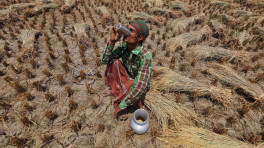Current account deficit flashes a warning to economy
According to the IMF, the nation will continue to witness a high deficit in the current account balance till 2027

Economists have called for minimising the deficit in the current account balance, as it stood at around 4% of the gross domestic product (GDP) at the end of FY22.
They warned of a full-blown financial crisis and inevitable growth slowdown if the deficit continues to be above the 3% red-line for the next three to five years.
"We cannot allow that to happen," Zaidi Sattar, chairman of the Policy Research Institute (PRI) of Bangladesh, told a seminar in Dhaka Sunday.
The country ended FY22 with a record $18.7 billion current account deficit, as the IMF Global Economic Outlook Report published in October this year predicted the nation will continue to witness a high deficit in the current account balance till 2027.
At the programme, Zaidi Sattar also said the country's foreign currency reserve is okay to meet the imports for next five to six months, but it is still below the comfort zone.
In the October report, the IMF too linked the current account deficit to the strain on the reserve, as it predicted the gap will be 3.8% of the GDP this year.
Citing a 34% export growth in FY22, Zaidi Sattar pointed at a 35% import surge at that time, which he said widened the current account gap last year.
As the pandemic waned in 2021 leading economies to reboot, world trade logged a sharp turnaround. But the Russia-Ukraine conflict in February this year jeopardised the half-patched recovery and roiled the global supply chain – causing energy, food and commodity prices soaring rapidly.
Against the turbulent economic backdrop, the economist noted four points to minimise the current account gap, which include restoration of supply-demand balance, restraining imports, maintaining exports and remittances at a pace of July-September period this year and unifying the exchange rates.
At the seminar titled "Realising Development Aspirations with Domestic Resource Mobilisation Amidst Microeconomic Challenges", PRI Executive Director Ahsan H Mansur said, "Storms are external, but we need to make sure that our houses are strong. More actions are needed to face the microeconomic challenges."
As the chief guest of the programme, Prime Minister's Economic Affairs Adviser Mashiur Rahman said different exchange rates are meant for providing the forex earners with "some social justice".
He, however, agreed upon limiting imports to save the depleting forex reserve. The adviser said Bangladesh needs to adopt global best practices in defining and maintaining it.
Mashiur Rahman said repayment of foreign debts would not be an issue for Bangladesh if the export growth continues.
He called for carrying out studies to find ways to raise the country's tax-GDP ratio – which is significantly low among the emerging economies.
The adviser also talked about ongoing power shortage and rationalising fertiliser subsidies by ensuring farming efficiency.
As the special guest of the seminar, State Minister for Planning Shamsul Alam said inflation should be the prime focus of macroeconomic management, as forex reserve will be at the core of concern.
He said the government is trying to reduce the amount of defaulted loans and increase the foreign exchange reserve.
Matt Cannell, development director of the Foreign, Commonwealth & Development Office (FCDO) Bangladesh, and Najmul Hossain, country representative of the Friedrich Naumann Foundation, also spoke at the programme.
Arif Dowla, managing director of ACI, and Kamal Kadir, CEO of bKash Limited, were the panellists at the seminar.


 Keep updated, follow The Business Standard's Google news channel
Keep updated, follow The Business Standard's Google news channel















